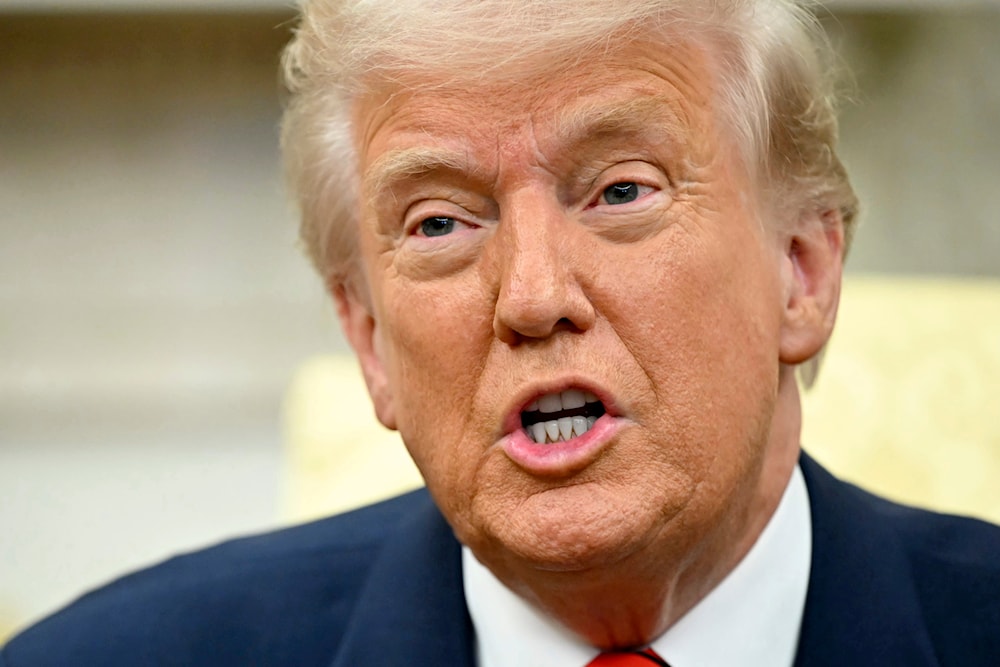Study says US consumer confidence plunged in March amid Trump tariffs
Consumer confidence in the United States is facing an unexpectedly sharp decline, as Trump escalates his tariff policy targeting friends and foes alike.
-
 President Donald Trump speaks to reporters during a meeting with NATO Secretary General Mark Rutte at the White House in Washington, Thursday, March 13, 2025 (AP)
President Donald Trump speaks to reporters during a meeting with NATO Secretary General Mark Rutte at the White House in Washington, Thursday, March 13, 2025 (AP)
Consumer confidence in the United States has witnessed a sharp drop in March of 2025, much below what experts previously expected, according to a new study published on Friday.
The study conducted by the University of Michigan highlighted that the index measuring consumer confidence fell to 57.9 in March, a 6.8-point drop compared to last month's 64.7, with Trump's chaotic tariff policy sparking fears of high inflation.
The drop marks a 10.5% decrease this month and a 27.1% over the past year, while analysts expected a smaller decline, reaching 63.2, according to a survey published by MarketWatch.
"While current economic conditions were little changed, expectations for the future deteriorated across multiple facets of the economy, including personal finances, labor markets, inflation, business conditions, and stock markets," the University of Michigan stated.
"Many consumers cited the high level of uncertainty around policy and other economic factors," the statement noted, adding that "frequent gyrations in economic policies make it very difficult for consumers to plan for the future, regardless of one's policy preferences."
The University of Michigan index for February, which also saw a sharp decline, sent a jolt through financial markets as the sentiment and spending patterns of Americans play a crucial role in shaping the overall health of the US economy.
Art Hogan, an analyst with Riley Wealth Management, told AFP that uncertainty has been growing since Trump initiated trade wars with both allies and rivals, adding that "announcements have been coming out haphazardly," noting that there is little surprise that sentiment is declining.
Robert Frick, an economist with Navy Federal Credit Union, stated in a note that while fluctuations in consumer confidence and sentiment typically don't translate directly into purchasing behavior, recent sharp declines alongside other factors suggest a potential slowdown in spending.
"This is bad news. People who fear losing jobs pull back on discretionary spending," said chief economist at Comerica Bank Bill Adams, adding that "people who are afraid the economy is headed into a ditch won't buy new cars or houses, go out to eat, or go on vacations."
Trump's tariffs shake up stock market
Uncertainty surrounding Trump’s trade policies and concerns that they could push the US into a recession have unsettled financial markets. Wall Street saw a second consecutive day of losses on Tuesday.
However, Trump dismissed concerns about his economic strategy, stating on Tuesday that he does not anticipate a downturn and downplaying the market declines. Trump’s trade policies have been marked by unpredictability. Less than 24 hours before the new tariffs took effect, he threatened to double the rate on Canadian steel and aluminum to 50%.
The move followed Canada’s Ontario province announcing an electricity surcharge on three US states in retaliation for earlier American tariffs. Trump reacted angrily, escalating tensions by suggesting plans to annex Canada.
The dispute led to a heated exchange of tariff threats between Washington and Ottawa. However, Ontario ultimately suspended the surcharge after negotiations with the US.
White House spokesperson Kush Desai said that Trump "used the leverage of the American economy" to "deliver a win for the American people."

 4 Min Read
4 Min Read








